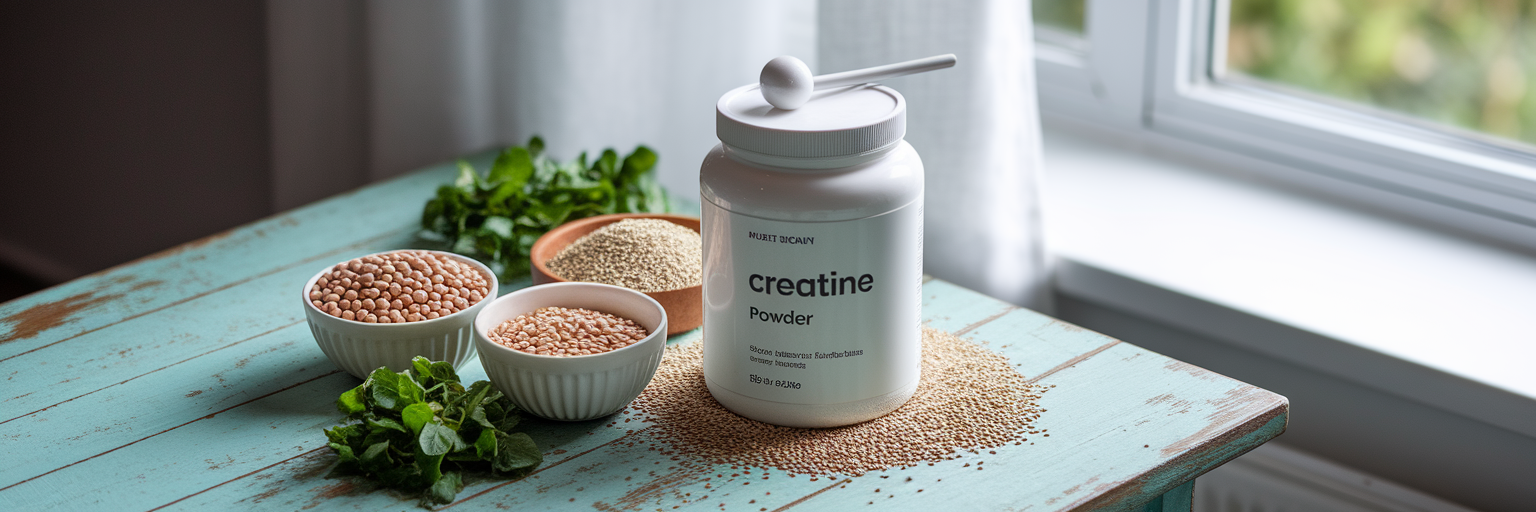Why Vegan Athletes Should Consider This Power Duo
As a vegan athlete, you already know what dedication looks like. You meticulously plan your meals and push your limits in the gym, all while staying true to your values. But what if you could support your hard work even more effectively? Combining vegan protein and creatine isn't a compromise; it's a smart, strategic move to help you achieve your fitness goals.
Many people still question how to build muscle as a vegan, but the truth is, a plant-based diet has everything you need to get strong. This guide is your science-backed roadmap to prove it. We'll show you exactly how these two supplements work together to support your performance and recovery.
You'll learn about the science behind this powerful combination, the specific advantages for plant-based athletes, the best way to time your intake, and practical tips to make it a seamless part of your daily routine. Let's get started.
Understanding the Science Behind Protein and Creatine Synergy
To appreciate why this combination works so well, it helps to understand what each supplement does on its own. Think of them as two specialists on the same team, each with a distinct but complementary job.
Creatine: The Energy Booster for Your Muscles
Imagine your muscles have a tiny, rechargeable battery for explosive movements like lifting a heavy weight or sprinting. That battery is powered by a molecule called ATP. When you perform an intense action, you use up ATP almost instantly. Creatine acts like the spark plug that rapidly recharges that battery, allowing you to push out those extra one or two reps that truly stimulate muscle growth. It gives your muscles the immediate energy they need to perform at their peak. For a deeper look into how it works, check out our guide on the effectiveness of creatine monohydrate.
Vegan Protein: The Building Blocks for Growth
If creatine provides the energy for the work, vegan protein provides the materials for the repair. When you lift weights, you create microscopic tears in your muscle fibers. This is a good thing; it's the signal your body needs to rebuild them stronger. Protein, made up of essential amino acids (EAAs), acts as the construction crew that arrives after the workout. It repairs those tears and adds new muscle tissue, a process known as muscle protein synthesis (MPS).
The Synergistic Effect: How They Work Together
Here’s where the magic happens. Creatine lets you train harder and create a greater stimulus for growth. That intense workout sends a loud and clear signal to your body: "We need to get stronger!" Vegan protein then answers that call by providing the necessary building blocks to repair and grow the muscle tissue. One fuels the demand, and the other provides the supply. A 2021 study published in the journal Nutrients found that post-exercise protein and creatine supplementation can be an effective strategy for maximizing muscle growth.
- Creatine: Increases your capacity for high-intensity work, leading to greater strength and power output.
- Vegan Protein: Delivers the essential amino acids required to repair muscle damage and build new muscle tissue.
Why This Combination Is a Game-Changer for Plant-Based Diets

While this duo is effective for any athlete, it offers some unique advantages for those on a plant-based diet. Creatine is naturally produced in the body but is also found in animal products like meat and fish. Because of this, vegans and vegetarians typically have lower baseline levels of creatine stored in their muscles.
But this isn't a disadvantage; it's an opportunity. As the Cleveland Clinic points out, individuals who don't get creatine from their diet may see more significant improvements in muscle and strength when they start supplementing. Because your muscle stores aren't already topped off, you're likely to notice a more pronounced boost in performance once you begin.
The vegan creatine benefits for athletes don't stop at the gym. Studies suggest that creatine supplementation can also support cognitive functions like memory and mental clarity, particularly in individuals with low dietary intake. It’s a win for your body and your brain. Best of all, you can rest easy knowing that modern creatine supplements are synthetically produced in a lab, making them 100% vegan-friendly and perfectly aligned with your lifestyle choices.
How to Time Your Intake for Maximum Muscle Growth
One of the most common questions we hear is about the best time to take creatine and protein. While there's a lot of debate online, the answer is simpler than you might think. For creatine, the most important factor is consistency. Taking it daily ensures your muscles remain saturated and ready for action. The specific time of day is less critical than just remembering to take it.
For protein, however, timing can offer a slight edge. After a workout, your muscles are primed for nutrient absorption, a period often called the "anabolic window." Consuming protein during this time directly fuels the muscle repair process when your body needs it most. Combining both supplements post-workout is a highly effective strategy. The creatine helps replenish energy stores while the protein gets straight to work on rebuilding muscle fibers.
So, what's the final verdict? Aim to take your protein and creatine shake shortly after your workout to optimize recovery. But don't stress if you can't. The benefits of these supplements are cumulative, and consistency will always be more important than perfect timing. On rest days, take your creatine anytime to maintain saturation levels, and use protein to help meet your daily intake goals. For a delicious way to refuel, you could mix your supplements into one of these 3 easy vegan protein recipes you'll actually crave.
| Timing Factor | Pre-Workout Intake | Post-Workout Intake |
|---|---|---|
| Primary Goal | Boost immediate performance and energy for the workout session. | Maximize muscle repair, recovery, and nutrient absorption. |
| Creatine Uptake | Good, but muscles are not yet depleted. | Potentially enhanced as depleted muscles are primed for nutrient uptake. |
| Protein Synthesis | Provides amino acids for the workout. | Directly fuels muscle protein synthesis (MPS) when it's most needed. |
| Practicality | Easy to remember as part of a pre-workout ritual. | Combines recovery and nutrition into one simple step after training. |
This table summarizes the strategic differences between pre- and post-workout timing. While both are effective, the data suggests a slight edge for post-workout consumption to optimize recovery and growth.
A Practical Guide to Your Supplement Routine

Moving from theory to practice should be simple. You don't need a complicated schedule to get great results. Here’s a straightforward, step-by-step guide to incorporating vegan protein and creatine into your daily life.
- Get Your Dosage Right: For most people, 3-5 grams of creatine monohydrate daily is the sweet spot. This is enough to keep your muscles saturated without any need for complicated calculations. For protein, aim for 20-40 grams per serving, especially after a workout, to effectively stimulate muscle repair.
- To Load or Not to Load?: Some people start with a "loading phase" for creatine (taking about 20 grams a day for a week) to saturate their muscles faster. It's an option, but it's not necessary. Simply starting with the 3-5 gram maintenance dose will get you to the same place in about three to four weeks, and it's often easier on the stomach.
- Mix It Up: The easiest method is to combine your vegan protein and creatine together in one shaker. The easiest method is to add a scoop of Creatine Monohydrate and a scoop of our Chocolate Vegan Protein into the same shaker bottle. Add water or your favorite plant-based milk, shake well, and you're good to go. It’s a simple and efficient way to get both supplements in at once.
- Don't Forget Rest Days: Consistency is key for creatine, so remember to take your 3-5 gram dose even on days you don't train. This keeps your muscle stores full. Protein intake on rest days is more flexible and should be based on your overall daily dietary goals.
What to Look for in Vegan Protein and Creatine
With so many options available, choosing high-quality plant based muscle growth supplements can feel overwhelming. Here are a few simple things to look for to ensure you're getting effective and clean products.
- For Creatine: Stick with Creatine Monohydrate. It is the most researched, effective, and affordable form on the market. Look for products that are third-party tested for purity and banned substances, indicated by seals from organizations like NSF or Informed-Sport.
- For Vegan Protein: Choose a protein blend that combines sources like pea, rice, or hemp. This ensures you get a complete amino acid profile, similar to what you'd find in whey protein. Check the label for low sugar content and avoid artificial fillers. If you're wondering which type is right for you, our breakdown of the best protein powders can help you decide.
- Check the Label: Always look for a clear "vegan" or "plant-based" certification on the packaging to ensure the product aligns with your values and is free from any animal-derived ingredients.
- Flavor and Mixability: Don't underestimate this! You're more likely to stick with a routine if you actually enjoy your post-workout shake.
Building Your Strongest Vegan Self
Combining vegan protein and creatine is more than just a supplement strategy; it's a powerful way to support your body, honor your hard work, and confidently pursue your strength goals. This science-backed duo is especially effective for plant-based athletes, helping you push harder, recover faster, and build muscle without compromise.
You have the dedication and the drive. Now you have a simple, effective tool to help you reach your full potential. Remember, building your strongest self is a journey, and every smart choice you make along the way counts.
Found this guide helpful? Share it with a friend who could use it! Ready to fuel your gains? Explore our full range of certified vegan supplements to get started.



